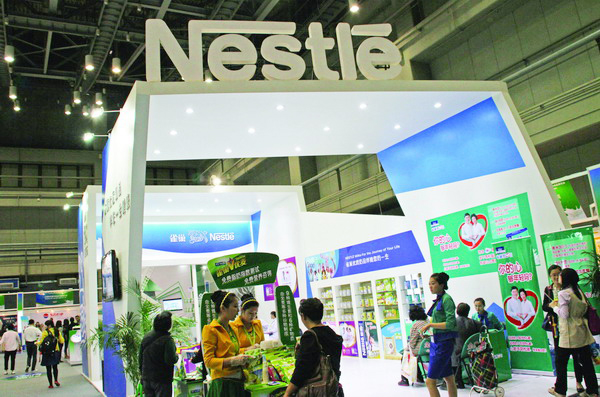Nestle protein powder targets health-conscious Chinese
Updated: 2013-01-22 09:42
By Li Woke (China Daily)
|
||||||||
Nestle SA, the world's largest food company by revenue, has expanded into the Chinese market's health food sector by introducing a protein powder believed to have great sales-growth potential.
Nestle Yiyang Protein Powder, which was unveiled in Beijing on Monday, will be introduced in seven large cities - Beijing, Tianjin, Shanghai, Xi'an, Qingdao, Hangzhou and Nanjing. Industry experts said the Chinese metropolises are the best-selling areas for light food where people have more money and pay more attention to health.
|
 Nestle SA's booth at a trade show in Beijing in October. The Chinese health food market has reached 105 billion yuan ($16.87 billion) in 2011, with an annual increase of 11.4 percent since 2006, according to the State Food and Drug Administration. [Photo / China Daily] |
"I am confident about this product," said Roland Decorvet, CEO of Nestle China. "China is not the oldest country in the world, but it is a fast-aging one. I believe the market (for health food) will be very strong."
The Chinese health food market reached 105 billion yuan ($16.87 billion) in 2011, with an annual increase of 11.4 percent since 2006, said the State Food and Drug Administration.
According to the administration, China in 2011 approved the registration of 813 new health food products, a year-on-year increase of 14.5 percent.
By 2015, the health food market in China will hit 450 billion yuan, said Hong Kong Trade Development Council, the international marketing arm for Hong Kong-based traders, manufacturers and service providers.
Nestle said the protein powder was researched, developed and launched in China, but raw materials for the product come from Switzerland and New Zealand.
According to the General Administration of Customs, health food imports reached 203 million yuan in 2010, a year-on-year increase of more than 30 percent. And sales of foreign health food products have maintained an annual increase of 12 percent.
US direct-selling giant Amway Corp said earlier that China has been its largest market for nine straight years. Sales revenue in the country reached 26.7 billion yuan in 2011, with its core health food brand, Nutrilite, accounting for nearly half of all the company's business.
According to Beijing-based S&P Consulting, China's per capita spending on health food is $31 per year, which accounted for 0.07 percent of their total annual consumption. By contrast, the figure in the United States and the European Union is around 2 percent, which is 29 times the Chinese level.
"Chinese consumers are likely to try Yiyang as Nestle's good quality and good science," said Alessandre Keller, vice-president of Dairy Business Unit of Nestle China's Food & Beverage Division. "Of course, there will be more Yiyang products in China, so just stay tuned."
liwoke@chinadaily.com.cn
Health food gains luster
Key Amway health food plant for Guangdong
Campaign to check health food producers
SFDA: Brain health food has never been ratified
China to raise health food standards
Also about Nestle SA
Nestle to launch new coffee product in China
Nestle to build two more R&D centers
Nestle sees 20% growth in China

 Li Na on Time cover, makes influential 100 list
Li Na on Time cover, makes influential 100 list
 FBI releases photos of 2 Boston bombings suspects
FBI releases photos of 2 Boston bombings suspects
 World's wackiest hairstyles
World's wackiest hairstyles
 Sandstorms strike Northwest China
Sandstorms strike Northwest China
 Never-seen photos of Madonna on display
Never-seen photos of Madonna on display
 H7N9 outbreak linked to waterfowl migration
H7N9 outbreak linked to waterfowl migration
 Dozens feared dead in Texas plant blast
Dozens feared dead in Texas plant blast
 Venezuelan court rules out manual votes counting
Venezuelan court rules out manual votes counting
Most Viewed
Editor's Picks

|

|

|

|

|

|
Today's Top News
Boston bombing suspect reported cornered on boat
7.0-magnitude quake hits Sichuan
Cross-talk artist helps to spread the word
'Green' awareness levels drop in Beijing
Palace Museum spruces up
First couple on Time's list of most influential
H7N9 flu transmission studied
Trading channels 'need to broaden'
US Weekly

|

|







